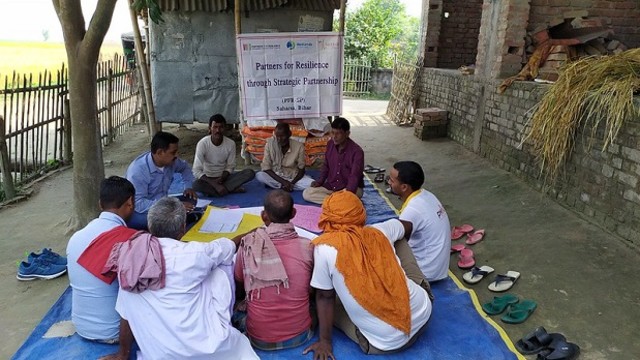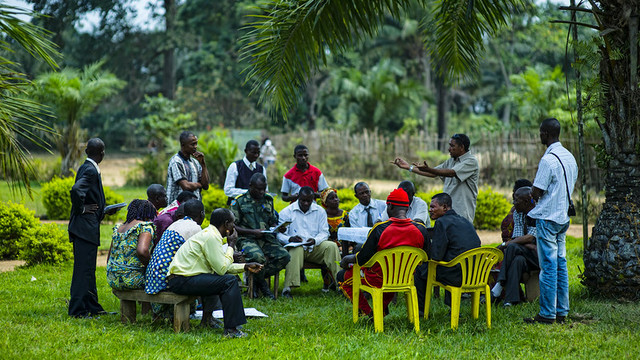Three things that stop development organisations being agents of change
Many development organisations fail to become true agents of change. Liz Carlile sets out some of the obstacles and asks how we can help bring hard science and local knowledge together to provide better solutions at the community level.


Men listen to a radio in the Ivory Coast. Many NGOs bring about change and influence behaviour through targeted multi-media communications campaigns, which include radio.
Last week in Nairobi I met up with partners Julius Mwanga and Busiinge Amooti from the Kabarole Research and Resource Centre (KRC) in Uganda. We talked about how to get robust, relevant research evidence into the hands of farmers. KRC believes in “putting the people first”. This means taking quality research that focuses on their communities’ needs and interpreting it in ways that give farmers quick answers to their pressing questions. The dialogue is fast, so demand for information about best practices grows.
While distinct, this chimes with the “triple loop” approach to climate change communication and social learning that we — IDS, IIED and friends — are exploring with CCAFS, the Climate Change and Agricultural Food Security research programme of the CGIAR. We have been thinking about ways the CGIAR centres could help bring hard science and local knowledge together to provide better solutions at the community level.
‘Development communications’, ‘research communications’ and all the related communications family has a well-established theory, and we continue to have new learning. But in my experience, what challenges many development organisations from being true agents of change is not so much about understanding the theory. It is about three other things:
1. We focus on delivery not change
For 50 years, development organisations have striven to give assistance, solve problems and provide answers through research and action. But we have focused on the collective challenge and not on individual end users. This orientation is at odds with the way effective organisations mobilise, change or drive consumer demand. We can learn from business here and reorient our organisations to listen for answers, take risks, be flexible, make quick decisions and change course. Our incentive structures, our need for consensus, and demands for over-meticulous accountability hamper fast action and therefore learning “on the job” or together. Our strategic objectives focus on implementation and delivery, but not on change.
2. We talk more than we listen – and on our terms
Even if we increasingly hear what our partners and stakeholders need, our approaches are still based on supplying knowledge and information on our terms— and in response to a global conversation rather than local demand. Kirsty Newman’s recent blog pushes us to explore this supply and demand in building research agendas. But even if we build a research agenda based on people’s needs, its power remains with the researcher and their team, who decide when and how to share findings.
3. Underinvestment means underachievement
We have yet to convince donors to support the communication skills and time required to get development information and research into use – whether by the policy community or local communities. To get this right – to really understand how change happens and predict potential tipping points – we need to invest. It is ironic that while great communication campaigns are applauded for their success, the praise rarely translates into money that development organisations can earmark for communication. We are trapped in a vicious cycle of underinvestment and therefore continued underachievement.
Two organisations we met in Nairobi share traits that illustrate how to combat these challenges. They know how to tell stories, and they listen hard to what users need or care about. Their audiences are all-important.
Well Told Story (WTS) produces Shujaaz a multi-media campaign targeted at Kenyan youth.
Its director, Rob Burnett, reminded us he was in the business of making change – not just communicating messages. WTS spends up to a fifth of its budget and a considerable proportion of its time talking with its audience and monitoring change against tightly defined and agreed indicators. How often do development organisations like ours work out the detail of the change we need and then decide the communications strategy required? Too often we must submit proposals for funding well in advance of that becoming a detailed reality.
The Mediae Trust has also spent years influencing behaviour through targeted multi-media communications, with a strong emphasis on local radio and TV. Most of us in the development and communications know and respect its TV show, Makutano Junction. Indeed my Ugandan colleagues were delighted to meet the trust’s founder, David Campbell, as the show is now also a favourite in Uganda. The trust’s success is based on understanding its audience’s needs and providing support on issues that represent a daily challenge.
The change we need
But few development organisations are structured to prioritise and listen to our audiences and respond to their needs quickly. Our funding structures and targets rarely allow that. We tend to work on global challenges that we believe have local realities, rather than taking learning from local priorities to inform global agendas.
At Rio+20, many of us questioned the status quo. Our work with CCAFS shows how. Our studies show that unless all partners in a shared learning process see change, the result is disempowerment and paralysis. We need to be agents in our own change processes rather than just talking about what others should do. I worry that we can end up theorising for too long when real change is in the practice.
This was originally posted on IDS' blog.
Read the IDS Bulletin article co-authored by Liz Carlile, Understanding context in learning-centred approaches to climate change communication.



